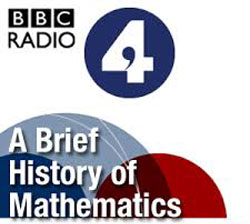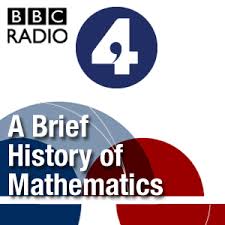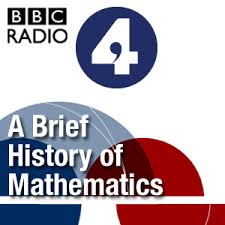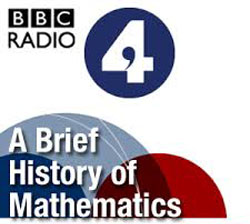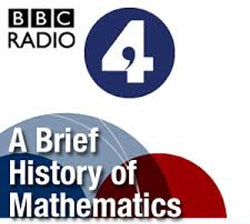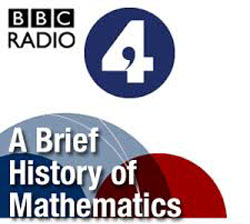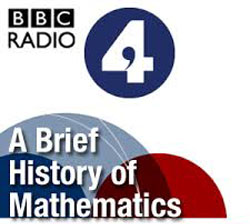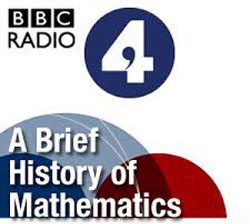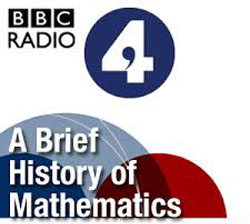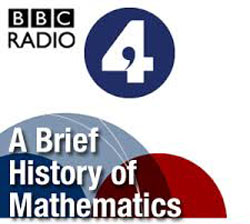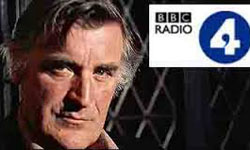Select one or more of these popular tags:
-
A Brief History of Mathematics - 01 Newton and Leibniz
-
Marcus du Sautoy
This ten part history of mathematics reveals the personalities behind the calculations: the passions and rivalries of mathematicians struggling to get their ideas heard. Marcus du Sautoy shows how these masters of abstraction find a role in the real world and proves that mathematics is the driving force behind modern science.
This ten part history of mathematics reveals the personalities behind the calculations: the passions and rivalries of mathematicians struggling to get their ideas heard. Marcus du Sautoy shows how these masters of abstraction find a role in the real world and proves that mathematics is the driving force behind modern science.
-
A Brief History of Mathematics - 02 Leonard Euler
-
Marcus du Sautoy
Today, how the mathematics that Leonard Euler invented two hundred years ago has transformed the internet. Euler's solution to an eighteeneth century conundrum paved the way for the search engines most of us use every day
Today, how the mathematics that Leonard Euler invented two hundred years ago has transformed the internet. Euler's solution to an eighteeneth century conundrum paved the way for the search engines most of us use every day
-
A Brief History of Mathematics - 03 Joseph Fourier
-
Marcus du Sautoy
Today, the mathematics of Joseph Fourier. It's thanks to his mathematical insight that you can hear Marcus on the radio and that Brian Eno can create sounds that have never been heard before.
Today, the mathematics of Joseph Fourier. It's thanks to his mathematical insight that you can hear Marcus on the radio and that Brian Eno can create sounds that have never been heard before.
-
A Brief History of Mathematics - 04 Evariste Galois
-
Marcus du Sautoy
Today how the mathematics of the French revolutionary, Evariste Galois, has proved invaluable to particle physicists working today.The mathematics that Galois began, over two hundred years ago, now absolutely describes the fundamental particles that make up our universe.
Today how the mathematics of the French revolutionary, Evariste Galois, has proved invaluable to particle physicists working today.The mathematics that Galois began, over two hundred years ago, now absolutely describes the fundamental particles that make up our universe.
-
A Brief History of Mathematics - 05 Carl Friedrich Gauss
-
Marcus du Sautoy
The 19th century mathematical celebrity. Professor Marcus du Sautoy describes how a study of asteroids led Gauss to describe the normal distribution.
The 19th century mathematical celebrity. Professor Marcus du Sautoy describes how a study of asteroids led Gauss to describe the normal distribution.
Today, the pioneering nineteenth century mathematicians who helped Albert Einstien with his maths: Jonas Bolyai, Nicolas Loachevski and Bernhard Riemann. Without the mathematics to describe curved space and multiple dimensions, the theory of relativity doesn't really work.
Today, the pioneering nineteenth century mathematicians who helped Albert Einstien with his maths: Jonas Bolyai, Nicolas Loachevski and Bernhard Riemann. Without the mathematics to describe curved space and multiple dimensions, the theory of relativity doesn't really work.
-
A Brief History of Mathematics - 07 Georg Cantor
-
Marcus du Sautoy
Today, Georg Cantor, the mathematician who showed us how to carry on counting when the numbers run out. An insight into the nature of infinity that Roger Penrose believes helps to explain why the human brain will always be cleverer than artificial intelligence.
Today, Georg Cantor, the mathematician who showed us how to carry on counting when the numbers run out. An insight into the nature of infinity that Roger Penrose believes helps to explain why the human brain will always be cleverer than artificial intelligence.
-
A Brief History of Mathematics - 08 Henri Poincare
-
Marcus du Sautoy
Today Henri Poincare, the man who proved there are certain problems that mathematics will never be able to answer: a mathematical insight that gave rise to chaos theory.
Today Henri Poincare, the man who proved there are certain problems that mathematics will never be able to answer: a mathematical insight that gave rise to chaos theory.
-
A Brief History of Mathematics - 09 Hardy and Ramanujan
-
Marcus du Sautoy
Today, G.H.Hardy, the mathematician who insisted he had never done anything useful. And yet his work on the "diabolical malice" inherent in prime numbers inspired the millions of codes that now help to keep the internet safe.
Today, G.H.Hardy, the mathematician who insisted he had never done anything useful. And yet his work on the "diabolical malice" inherent in prime numbers inspired the millions of codes that now help to keep the internet safe.
-
A Brief History of Mathematics - 10 Nicolas Bourbaki
-
Marcus du Sautoy
Today, the mathematician that never was, Nicolas Bourbaki. A group of French mathematicians, working between the two world wars and writing under the pseudonym Nicolas Bourbaki transformed their discipline and paved the way for several mathematical breakthroughs in the 21st century.
Today, the mathematician that never was, Nicolas Bourbaki. A group of French mathematicians, working between the two world wars and writing under the pseudonym Nicolas Bourbaki transformed their discipline and paved the way for several mathematical breakthroughs in the 21st century.
-
A Brief History of the End of Everything - 04 The universe is expanding - we're all doomed
-
Brother Guy Consolmagno
The universe will die. The sun and other stars like it will throw out heat until they have no more energy to burn. The big bang threw everything outwards at a massive rate. As it gets bigger, so the gaps between matter get bigger and are filled with "dark energy". Instead of gravity pulling everything back down to a "big crunch" the dark energy accelerates the expansion process, pushing everything further apart faster and faster. In the end everything will be a cold, sad, blackness as the stars all go out, or are too far apart for us to see anything - but "us" will be long gone.
The universe will die. The sun and other stars like it will throw out heat until they have no more energy to burn. The big bang threw everything outwards at a massive rate. As it gets bigger, so the gaps between matter get bigger and are filled with "dark energy". Instead of gravity pulling everything back down to a "big crunch" the dark energy accelerates the expansion process, pushing everything further apart faster and faster. In the end everything will be a cold, sad, blackness as the stars all go out, or are too far apart for us to see anything - but "us" will be long gone.
-
A Brief History of the End of Everything - 05 Oops, I've dropped an exotic particle
-
Brother Guy Consolmagno
A strange subatomic particle produced in an atom-smashing experiment here on earth could, theoretically, tumble to the centre of the planet and start eating the planet from the inside out - death by industrial accident. Or a random quantum fluctuation in distant space could switch off the machinery that makes matter big, and this would send a bubble of destruction moving at the speed of light and shutting down all creation in its path. All of the ideas explored in this series suggest that the future is not rosy - that the universe is going to end and that we will end along with it...or can we escape?
A strange subatomic particle produced in an atom-smashing experiment here on earth could, theoretically, tumble to the centre of the planet and start eating the planet from the inside out - death by industrial accident. Or a random quantum fluctuation in distant space could switch off the machinery that makes matter big, and this would send a bubble of destruction moving at the speed of light and shutting down all creation in its path. All of the ideas explored in this series suggest that the future is not rosy - that the universe is going to end and that we will end along with it...or can we escape?
-
A Brief History of the End of Everything - 01 It's OK, the universe is eternal
-
Brother Guy Consolmagno
A series exploring how our ideas about the end of the universe have been shaped by religion, belief, and the contemporary state of scientific thinking and observation. The series is presented by Vatican Astronomer, Brother Guy Consolmagno. He is a Jesuit astro-physicist who came to religion via science and his wonder at the universe. At the Vatican Observatory in Castel Gandolfo, Italy, he compares cutting edge cosmology with Chinese, Ancient Greek, Buddhist, Medieval and Victorian ideas about the end of everything.
A series exploring how our ideas about the end of the universe have been shaped by religion, belief, and the contemporary state of scientific thinking and observation. The series is presented by Vatican Astronomer, Brother Guy Consolmagno. He is a Jesuit astro-physicist who came to religion via science and his wonder at the universe. At the Vatican Observatory in Castel Gandolfo, Italy, he compares cutting edge cosmology with Chinese, Ancient Greek, Buddhist, Medieval and Victorian ideas about the end of everything.
-
A Brief History of the End of Everything - 02 The universe will crash - we're all doomed
-
Brother Guy Consolmagno
It will die. Like a ball thrown into the air, no matter how fast the acceleration to begin with, gravity always wins. The universe will reach a critical mass, then start to fall back in on itself. This is the big crunch theory. The power of gravity wins out over the accelerating power throwing everything outwards. Microseconds from the end, black holes begin to merge with each other, little different from the collapsing state of the surrounding universe. The implosion becomes increasingly powerful, crushing all matter and every physical thing out of existence. Space and time end - there is eternal nothingness beyond this point, unless...
It will die. Like a ball thrown into the air, no matter how fast the acceleration to begin with, gravity always wins. The universe will reach a critical mass, then start to fall back in on itself. This is the big crunch theory. The power of gravity wins out over the accelerating power throwing everything outwards. Microseconds from the end, black holes begin to merge with each other, little different from the collapsing state of the surrounding universe. The implosion becomes increasingly powerful, crushing all matter and every physical thing out of existence. Space and time end - there is eternal nothingness beyond this point, unless...
-
A Brief History of the End of Everything - 03 Lets go round again
-
Brother Guy Consolmagno
Yes the universe will end, but at the crunch the process starts all over again, and could go on forever (cf. Hindu and Buddhist ideas of re-birth). Another possibility is "multiverses" - there are lots of different universes, all in different states of existence, some at moment of big bang, but will never become a universe as we know it, so grow to the size of a grape and shrink back, or expand outwards and never turn into frothy, lumpy matter - just a thin soup with no life in them. Our universe is perfect…not too fast to become a soup and not too slow so it falls back in on itself to destruct - just lumpy enough for galaxies to form and the whole thing hold together - a balancing act between gravity and acceleration, for the time being.
Yes the universe will end, but at the crunch the process starts all over again, and could go on forever (cf. Hindu and Buddhist ideas of re-birth). Another possibility is "multiverses" - there are lots of different universes, all in different states of existence, some at moment of big bang, but will never become a universe as we know it, so grow to the size of a grape and shrink back, or expand outwards and never turn into frothy, lumpy matter - just a thin soup with no life in them. Our universe is perfect…not too fast to become a soup and not too slow so it falls back in on itself to destruct - just lumpy enough for galaxies to form and the whole thing hold together - a balancing act between gravity and acceleration, for the time being.
The final programme in Neil MacGregor's world history as told through things. For his last object he has selected a solar-powered lamp and charger that is already changing lives.
The final programme in Neil MacGregor's world history as told through things. For his last object he has selected a solar-powered lamp and charger that is already changing lives.
-
A History of the World in a 100 Objects - Early Victorian tea set : Mass production, mass persuasion (1780-1914AD)
-
Neil MacGregor
Neil MacGregor's world history through objects. This week he is exploring the global economy in the 19th century. Today, the story of Britain's favourite drink - with a tea set!
Neil MacGregor's world history through objects. This week he is exploring the global economy in the 19th century. Today, the story of Britain's favourite drink - with a tea set!
-
A Map of British Poetry - Programme 1: Borders
-
Radio 4
The edges of things - arbitrary lines drawn on a map; the borders between people; between species; between mental states. Thinking about the placers where one thing ends and become something else - a language, a people...or the gulf between life and death. We resent borders but we rely on them too. They keep things in, as well as keeping things out and over the centuries, poets have been magnetised by them. Poetry is after all, a journey from one state to another.
The edges of things - arbitrary lines drawn on a map; the borders between people; between species; between mental states. Thinking about the placers where one thing ends and become something else - a language, a people...or the gulf between life and death. We resent borders but we rely on them too. They keep things in, as well as keeping things out and over the centuries, poets have been magnetised by them. Poetry is after all, a journey from one state to another.
-
Abduction, Alienation and Reason
-
Radio 4
Not many scientists are prepared to take tales of alien abduction seriously, but John Mack, a Harvard professor who was killed in a road accident in north London last year, did. Ten years on from a row which nearly lost him his job, hundreds of people who claim they were abducted still revere him.
Not many scientists are prepared to take tales of alien abduction seriously, but John Mack, a Harvard professor who was killed in a road accident in north London last year, did. Ten years on from a row which nearly lost him his job, hundreds of people who claim they were abducted still revere him.
-
Afternoon Play - An Interlude of Men
-
Lesley Bruce
Bren and Hilly have been lifelong friends, so when Hilly breaks her wrist Bren comes to help. They both anticipate the pleasure of long days together comfortably trashing the years they were apart, but their friendship is not that simple.
Bren and Hilly have been lifelong friends, so when Hilly breaks her wrist Bren comes to help. They both anticipate the pleasure of long days together comfortably trashing the years they were apart, but their friendship is not that simple.
-
Afternoon Play - Hard Road
-
Simon Vinnicombe
Bradley is an angry young 14-year-old struggling with the arrival of his new step-mother so soon after the death of his mother.
Bradley is an angry young 14-year-old struggling with the arrival of his new step-mother so soon after the death of his mother.
-
Afternoon Play - Man of Steel
-
Frances Byrnes
Frances Byrnes's drama, set in Sheffield in 1982, is based on her own experience and that of her father and many of his friends as their lives are wrecked by redundancy. A job advertisement appears in the local paper.
Frances Byrnes's drama, set in Sheffield in 1982, is based on her own experience and that of her father and many of his friends as their lives are wrecked by redundancy. A job advertisement appears in the local paper.
-
Afternoon Play - My Man and Me
-
Bettina Gracias
Odd couple Lal and Paul run their own dry-cleaning shop. The path to true love is littered with obstacles including age difference, guilt, cultural chasms and etymology.
Odd couple Lal and Paul run their own dry-cleaning shop. The path to true love is littered with obstacles including age difference, guilt, cultural chasms and etymology.
-
Afternoon Play - The Conversation
-
Toby Swift
Dramatic reconstruction of a conversation between Trevor Friedman and Roman Halter, whose fathers were Jewish slave labourers in Poland and then Germany. Trevor knew almost nothing of his father's extraordinary story until 24 years after his death. With Harry Towb, Jonathan Tafler. Directed by Toby Swift.
Dramatic reconstruction of a conversation between Trevor Friedman and Roman Halter, whose fathers were Jewish slave labourers in Poland and then Germany. Trevor knew almost nothing of his father's extraordinary story until 24 years after his death. With Harry Towb, Jonathan Tafler. Directed by Toby Swift.
-
Afternoon Play - The Man Who Built Tunnels
-
Natalia Powers
The Man Who Built Tunnels: Natalia Power's haunting tale of unrequited love in which the 79-year-old Duke of Portland receives a visitation from a once famous opera singer.
The Man Who Built Tunnels: Natalia Power's haunting tale of unrequited love in which the 79-year-old Duke of Portland receives a visitation from a once famous opera singer.
-
Afternoon Play - The Ted Hughes Letters
-
Ted Hughes
Novelist Jane Feaver introduces a selection of previously unheard letters from the late Poet Laureate, written to family, friends, academics, children and fellow writers. Read by Richard Armitage. Producer Susan Roberts.
Novelist Jane Feaver introduces a selection of previously unheard letters from the late Poet Laureate, written to family, friends, academics, children and fellow writers. Read by Richard Armitage. Producer Susan Roberts.
-
Amongst the Medici - Episode 1: Bankers to the Renaissance
-
Bettany Hughes
The Medici are synonymous with the Renaissance, but why did these bankers act as patrons to artists like Michelangelo and Donatello - was it a love of art or something more sinister?
The Medici are synonymous with the Renaissance, but why did these bankers act as patrons to artists like Michelangelo and Donatello - was it a love of art or something more sinister?
Classicist Bettany Hughes continues her journey through the beauty and the blood-letting of Renaissance Florence. Could it be that the Renaissance as we know it wasn't a renaissance at all? Could Donatello's David really be a political statement for the Medici? And what has Liverpool got to do with it? Bettany finds that the Renaissance is more than it's cracked up to be.
Classicist Bettany Hughes continues her journey through the beauty and the blood-letting of Renaissance Florence. Could it be that the Renaissance as we know it wasn't a renaissance at all? Could Donatello's David really be a political statement for the Medici? And what has Liverpool got to do with it? Bettany finds that the Renaissance is more than it's cracked up to be.
Historian Bettany Hughes concludes her journey through the beauty and the blood of renaissance Florence. This week she finds that, contrary to popular belief, it was smart women, gay men and false gods who made the corner stones of western civilisation
Historian Bettany Hughes concludes her journey through the beauty and the blood of renaissance Florence. This week she finds that, contrary to popular belief, it was smart women, gay men and false gods who made the corner stones of western civilisation
-
An Earth Made for Life - Programme 3: Sex, Death and War
-
Gabrielle Walker
In the second series of An Earth Made for Life Gabrielle Walker continues her quest to understand why complex life is found on our planet, but not on any of our celestial neighbours. From the outback of Australia to the walls of the Grand Canyon Gabrielle unearths evidence of the dramatic changes that took place on our planet billions of years ago which may have triggered the rise of animals.
In the second series of An Earth Made for Life Gabrielle Walker continues her quest to understand why complex life is found on our planet, but not on any of our celestial neighbours. From the outback of Australia to the walls of the Grand Canyon Gabrielle unearths evidence of the dramatic changes that took place on our planet billions of years ago which may have triggered the rise of animals.

